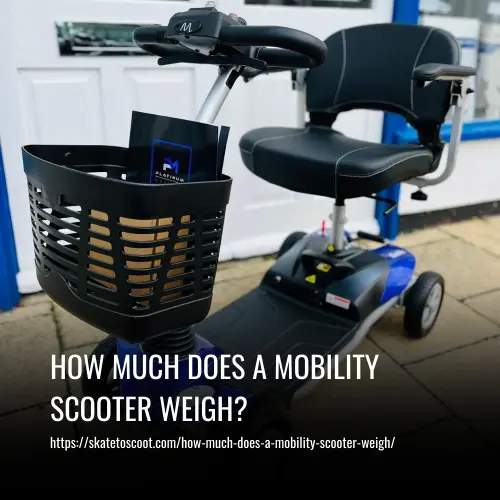How Much Does a Mobility Scooter Weigh?
This post contains affiliate links. As an Amazon Associate, we earn from qualifying purchases.
The weight of a mobility scooter can vary depending on factors such as the type, size, and additional features of the scooter. On average, mobility scooters weigh between 35 to 300 pounds. Lightweight travel scooters typically weigh around 35 to 60 pounds, making them easier to handle and transport.
Heavy-duty scooters, designed for rugged terrain and heavier users, can weigh between 100 to 300 pounds. Some scooters may have additional features, such as a basket or canopy, which can also add weight.
The weight of a mobility scooter should be considered when evaluating its portability and maneuverability, as well as determining if it can accommodate the user’s weight capacity.

Different Types of Mobility Scooters And Their Weigh
The weight of a mobility scooter plays a crucial role in its usability and portability. Understanding the weight of different types of mobility scooters can help individuals choose a scooter that meets their specific needs and requirements. Here we will explore the different types of mobility scooters and their respective weights.
1. Travel Mobility Scooters
Travel mobility scooters are designed to be easily disassembled and stored in a car trunk. These scooters are lightweight, making them ideal for individuals who frequently travel. The heaviest piece of a travel mobility scooter typically weighs between 25-35 pounds.
2. Three-Wheel Mobility Scooters
Three-wheel mobility scooters are compact and maneuverable, making them perfect for indoor use. Compared to their four-wheel counterparts, three-wheel scooters are lighter in total weight. The heaviest piece of a three-wheel mobility scooter usually weighs between 20-30 pounds.
3. Four-Wheel Mobility Scooters
Four-wheel mobility scooters are larger and sturdier, making them better suited for outdoor use. These scooters provide enhanced stability, especially when getting on and off the scooter. The heaviest piece of a four-wheel mobility scooter typically weighs between 30-40 pounds.
4. Heavy-Duty Mobility Scooters
Heavy-duty mobility scooters are designed for individuals who require a higher weight capacity and greater stability. These scooters feature a reinforced frame to support the weight of larger riders. The heaviest piece of a heavy-duty mobility scooter can weigh up to 65 pounds.
Factors Affecting the Weight of a Mobility Scooter
The weight of a mobility scooter can vary depending on several factors. These factors include the battery size, motor size, frame material, suspension, and additional features. Understanding these factors can help users choose the right mobility scooter for their needs.
1. Battery Size
One of the heaviest components of a mobility scooter is the battery. The size of the battery determines the scooter’s range and speed. A larger battery will provide a longer range but also adds more weight to the scooter. Users should consider their desired range before choosing a scooter with a larger battery.
2. Motor Size
The motor is another significant factor that affects the weight of a mobility scooter. A more powerful motor is generally heavier but allows the scooter to handle steep inclines and rough terrain more efficiently. Users who need to navigate challenging terrains should opt for a scooter with a larger motor.
3. Frame Material
The material used to make the frame of a mobility scooter also plays a role in its weight. Steel frames are the heaviest, followed by aluminum frames, while titanium frames are the lightest. Users who prioritize lightweight scooters may opt for those with aluminum or titanium frames.
4. Suspension
The suspension system of a mobility scooter also affects its weight. Advanced suspension systems designed for a smoother ride tend to be heavier than basic suspension systems. Users who value a comfortable ride may need to consider the weight implications of a more advanced suspension.
5. Additional Features
Additional features such as canopies, baskets, and other accessories can add extra weight to a mobility scooter. These features enhance the convenience and usability of the scooter but should be considered when determining the overall weight.
Why Weight Matters When Choosing Your Mobility Scooter
When it comes to choosing a mobility scooter, the weight of the scooter is an important factor to consider. It not only affects its portability but also its maneuverability and battery life. Here’s why weight matters when selecting a mobility scooter:
1. Portability
If you frequently travel or need a scooter that can be easily transported, opting for a lightweight scooter is crucial. Lightweight scooters are easier to disassemble, fold, or load into a vehicle. They are also more convenient for public transportation or navigating narrow spaces.
2. Maneuverability
The weight of a mobility scooter can impact its maneuverability, especially in tight spaces or crowded areas. A lighter scooter is generally easier to navigate, making it more suitable for indoor use or maneuvering through doorways and hallways.
3. Battery Life
The weight of the scooter can also affect its battery life. Heavier scooters may require a larger battery to support their weight, which can result in shorter battery life. On the other hand, lighter scooters may have smaller batteries but can still provide sufficient power for shorter trips.
How Weight Affects the Functionality of Different Models
The weight of a mobility scooter plays a significant role in determining its functionality and suitability for different users. Understanding how weight impacts different scooter models can help you make an informed decision when choosing the right one for your needs.
1. Portability
Lightweight mobility scooters are designed to be easily transported and maneuvered. These scooters are ideal for individuals who frequently travel or need to transport their scooters in a vehicle. They can be conveniently disassembled or folded, making them easy to store and transport.
2. Weight Capacity
The weight of a mobility scooter is closely related to its weight capacity. Heavier scooters often have a higher weight capacity, allowing them to accommodate individuals with larger body frames or those who require additional support. It is important to consider the weight of the scooter itself when looking for a higher weight capacity, ensuring it can safely support your needs.
3. Stability
The weight of a mobility scooter can also affect its stability, especially when navigating uneven terrain or slopes. Heavier scooters tend to offer more stability, providing a smoother and safer ride, particularly for outdoor use or on rough surfaces.
4. Battery Life
The weight of the scooter’s battery is another factor to consider. Larger batteries typically offer a longer range, allowing you to travel greater distances without recharging. However, it is important to note that larger batteries contribute to the overall weight of the scooter. If you require an extended battery life, you may need to consider a model with a slightly higher weight.
Lightweight Mobility Scooter Options
When it comes to lightweight mobility scooters, manufacturers have created foldable options that prioritize portability and ease of use. These scooters are designed to be easily stored in a vehicle trunk or carried by hand, making them ideal for travel or day trips.
Some of the lightest folding scooters on the market weigh as little as 35 lbs, while still offering weight capacities of up to 200 or 250 lbs. These scooters may not have the speed or range of heavy-duty models, but they provide convenience and flexibility for light, infrequent use.
Some even come with a remote control for automatic folding, while others have a compact design that allows for easy manual folding. Overall, lightweight mobility scooters offer a practical and versatile option for those on the go.
Tips for Choosing the Right Weight Mobility Scooter
When choosing a mobility scooter, it’s important to consider the weight of the scooter itself. The weight can affect its maneuverability, transportability, and stability. Here are some tips to help you choose the right weight mobility scooter for your needs:
1. Evaluate Your Needs
Start by assessing your lifestyle, daily activities, and mobility requirements. Determine whether you will primarily use the scooter indoors or outdoors, for long-distance travel or short trips around the neighborhood.
2. Consult a Healthcare Professional
If you have specific mobility needs or concerns, it is advisable to consult with a healthcare professional or an occupational therapist. They can provide valuable guidance and recommendations based on your unique circumstances.
3. Test Drive
Whenever possible, test drive different mobility scooter models to get a feel for their weight, maneuverability, and overall comfort. This will help you determine which scooter suits you best and meets your specific requirements.
4. Consider Accessories
Some mobility scooters come with additional accessories or features that can enhance your overall experience. However, keep in mind that these accessories may add extra weight to the scooter. Evaluate whether the added features are necessary for your needs and if they are worth the additional weight.
By following these tips, you can choose a mobility scooter that is the right weight for your needs, providing you with greater mobility and independence.
FAQs
It depends on the weight of the scooter and your personal strength and abilities. Some lighter weight and foldable models may be easier to lift and transport, while heavier scooters may require assistance or specialized equipment for lifting.
Yes, mobility scooters have weight limits to ensure safe operation and prevent damage to the scooter. The weight limit is typically specified by the manufacturer and should be followed to avoid accidents or mechanical issues.
The weight capacity of a mobility scooter typically ranges from 250 to 400 pounds. Heavy-duty models may have higher weight capacities to accommodate individuals with larger frames.
Mobility scooters are designed to provide stability, durability, and comfort. To achieve these features, they are built with sturdy frames, powerful motors, and necessary components which contribute to their weight.
Yes, there are lightweight mobility scooters available for individuals who require a lighter option. These scooters are designed with lightweight materials and compact frames, making them easier to transport and maneuver.
Conclusion
In conclusion, the weight of a mobility scooter can vary depending on the specific model and features. The average weight range typically falls between 80 and 200 pounds. While lighter and foldable models may be easier to lift and transport, heavier scooters may require assistance or specialized equipment.
It is important to choose a scooter with a weight capacity that can safely support your body weight and any additional items you may carry. There are lightweight mobility scooters available, weighing between 50 and 100 pounds, designed for portability and convenience. These scooters often feature foldable frames, making them easier to store and transport.
Ultimately, the weight of a mobility scooter should be considered alongside other factors such as battery capacity, travel range, and desired features to find the best fit for your mobility needs.
